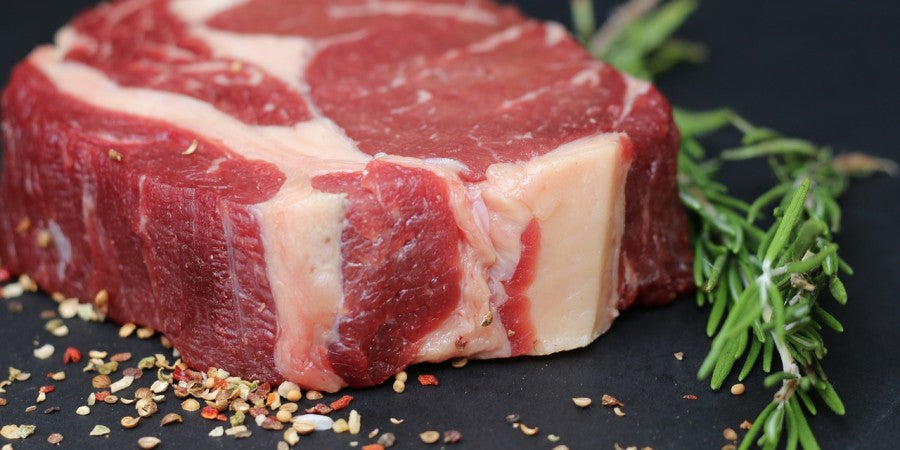The word carnivore comes from the Latin words caro , meaning "meat" and vorare meaning "to devour". So it basically means meat eater, which terms this diet nicely, as all you can eat on the Carnivore Diet is meat. Thats correct its a meat only diet. And it brings some benefits.
Where does the Carnivore Diet come from?
With the rise of veganism over the last years and many vegans transforming their diet into an ideology it is a natural progression that an opposition is created, that was what I initially thought when I heard a podcast with Dr. Shawn Baker, an MD from New Zealand who at the time only ate meat for over a year, feeling great and actually set a world record in rowing being over 50 years old (1). Compared to the Vegan Diet he Carnivore Diet is on the other end of the of a plant to animal ratio in a diet continuum, instead of all-plants its all-meat. Which isn't actually that new. Dr Baker tells some stories of people he met after starting an all-meat diet who did the same for 10 to 20 years and doing great on it. And by "doing great" I mean being vibrant, lean, strong and healthy. I can also recall reading a story in Flex magazine about 10 years ago of a Dutch bodybuilder from the 90s who would get in shape for a competition by only eating two roasted whole chickens per day. And it worked well for him. Another similar approach from the 50s was by legendary bodybuilding coach Vince Gironda whose approach to nutrition to build lean and muscular physique that are now known as the classics bodybuilding physiques was simple, only eat steak and eggs for 5 days in a row followed by one day of eating what likes. I did that with great success over 60 years ago. Yet, a carnivorous approach has been around for much longer.
Has the Carnivore Diet been around for thousands of years?
When speaking of diet from evolutionary and survival standpoint the most important question is can a diet provide enough nutrients especially macronutrients to ensure life. Which leads to one of the main points why a vegan diet is a modern phenomenon. As a base rule, all plants have a low-macronutrient density if not produced by agriculture. And agriculture has been around for 6000 to 12000 years depending on the region. Yet, mankind is much older than that. That means before agriculture a plant-based diet would be low-carb, low-fat and low-protein and therefore not ideal to ensure survival. On the other hand animal products have a high density of the two essential marco nutrients, thats protein and fat. Carbohydrates are non-essential that means a human can survive from a physiological standpoint without ever eating it, as humans did quite well before there was agriculture and therefore no option to consistently eat carbohydrate-rich foods. So, pre-agriculture animal products, mainly meats, would make up over 90% over the human caloric intake with a slight variation depending on the genotype and the latitude the humans lived in. The closer to the equator the higher the plant-intake, the further away the higher the meat intake. With humans living close to the poles such as the Inuits eating an all-meat diet for parts or even the whole year. So the Carnivore Diet in parts and its extreme has been around for a very long time. And was actually the backbone of our diet that ensure survival and evolution.
The Carnivore Diet and Autoimmunity
Autoimmunity is a very interesting topic and I recently heard from a young women called Mikhaila with severe depression and autoimmune issues, such as arthritis that affected 37 joints of her body and led to a hip replacement and ankle replacement by age 17 and many others symptoms (2). She wanted to figure what was wrong and what she could do to decrease her issues. One thing she noticed is that during exam time in university she felt the worst. One reason she thought could be stress. Another she figured out is that she ate a lot of sandwiches during that time. So, gave a gluten free diet a chance and cut all breads which led to an improvement of symptoms. So she thought if one type of food can make such a difference why not cut more. Which eventually led her to only eating chicken and broccoli for a full two months. Which then surprisingly got rid of almost all her symptoms. She then moved to the Carnivore Diet which made her feel the best ever. Her depression, gone. Her autoimmune issues, gone. Clearly a fascinating story that also makes sense as an extreme on a lot of levels on a scientific base. That story together with a The Times article (3) had me going back looking more into the Carnivore Diet and trying it for the first time.
What can you eat on the Carnivore Diet?
As the name says, all you eat is meat. No carbohydrates. No dairy. No eggs. No plants. No starches. No sugar. Water, coffee, tea and salt are ok. Plus meat. Its common for some active males to consume two to three kilos of meat per day. Preferably from fattier cuts such as rib eye steak as well as organ meats for their high nutrient content.
What are the benefits of the Carnivore Diet?
First, form a rational standpoint this diet supplies plenty of the two essential macro nutrients, protein and fat.
Second, the Carnivore Diet is gluten-free, lactose-free, dairy-free, sugar-free, carbohydrate-free, transfat-free, plantoil-free and soy-free. Which makes the Carnivore Diet hypoallergenic and anti-inflammatory.
Third, the biggest benefits empirically reported are more energy, less body fat, more muscle mass, more strength, more endurance and much greater general wellbeing.
Will you create micronutrient deficiencies on a carnivore diet?
Thats definitely one of the first questions that will come up when limiting your food choice to such few choices. First, the number one factor that increases micronutrient needs is stress. Taking some nutritional stressors away will actually reduce the micronutrient needs and this way limit micronutrient deficiency. With some micronutrients like Vitamin C their need actually reduces a lot when eliminating carbohydrates from the diet, as both are very similar molecular standpoint (the majority of isolated Vitamin C is actually chemically derived from sugar) and compete for the same receptors (4) with glucose being the superior one and that way not eating any carbohydrates like on a carnivore diet decreases vitamin C needs. Also, the empirical evidence points towards high energy and vibrant health which is good indicator for micronutrient status. More research and laboratory work on this needs to be done as a whole and by the individual.
Is the Carnivore Diet just another Ketogenic Diet?
No, the Carnivore Diet is not another ketogenic diet as the protein amounts are way to high to reach ketosis for most.
Will all the potential excess protein be converted to glucose via gluconeogenesis?
No, it will not. This requires a more lengthy answer that I go into at the YPSI Module 4 seminar. The short version is, Gluconeogenesis is highly inefficient process.
What's the biggest downside of the Carnivore Diet?
Many would say that consuming this much meat will lead to cardiovascular disease and more. Yet, the research actually shows the opposite, this diet takes away the primary nutritional factors that cause disease. So what the downside? The first one that I clearly see is that on a The-Purpose-of-Food-Continuum from function on the far left to pleasure on the far right the Carnivore Diet is very far on the left. Pleasure is the single most deciding factor when making food choices, so far many completely going on a Carnivore Diet would be a huge change and sacrifice.
Only meat, really?
By now its clear the Carnivore Diet is an extreme approach.
Would I recommend this to everyone? No.
Will I recommend this to all my clients and athletes? No.
Will I recommend this to some of my clients and athletes to try it out for a period of time? Absolutely yes.
Whenever something works, there is definitely something to take away. I have played around with the first idea myself and started trying some on some clients.
An all meat diet is not for everyone. Just from a standpoint of genotype. Plants do have benefits. Some genotypes have evolved on a higher percentage of plants in their diet. Yet, the Carnivore Diet clearly shows some benefits and also actually makes more sense from an evolutionary and survival standpoint than an all-plant approach.
If you tried or will try the Carnivore Diet I would be happy to hear your experience, comment on social media or sent me an email.
lf you try it, all the Best with the Carnivore Diet!
References:
(1) www.shawn-baker.com
(2) www.mikhailapeterson.com
(3) www.thetimes.co.uk/article/mikhaila-peterson-jordan-peterson-an-all-beef-diet-cured-my-depression-7hrxc97bq
(4) www.ncbi.nlm.nih.gov/pubmed/10613768

